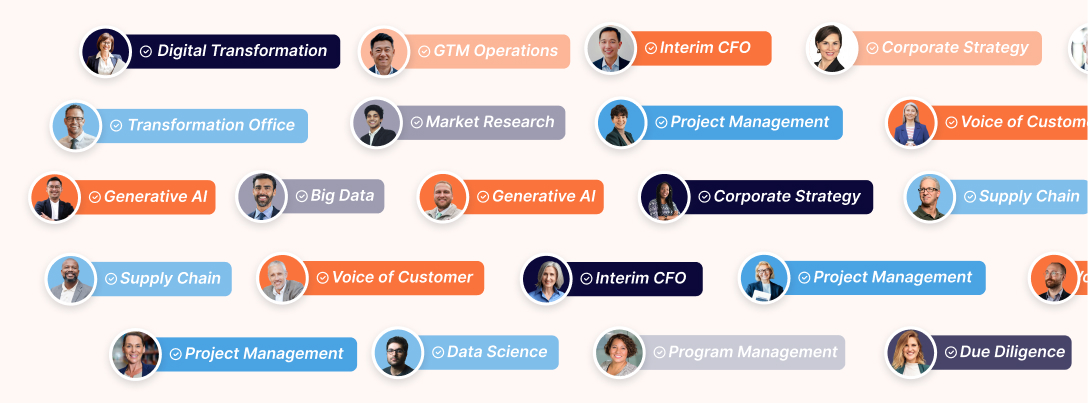The Advantages of Fractional Talent and Interim Support

In today’s fast-paced business world, enterprises and private equity firms are constantly seeking ways to streamline their operations and grow their businesses. Hiring freezes, budget cuts, and strategy pivots can all require a corresponding reshuffle of an organization’s human capital strategy, organizational design, or go-to-market approach.
One approach that has gained traction in recent years is the use of fractional talent and interim support. Whether it’s due to a temporary leadership vacancy, skill gaps in the workforce, or a need for specialized expertise, many organizations have turned to fractional talent and interim executives as a solution. These professionals provide specialized expertise on a part-time or temporary basis, allowing organizations to stay agile and flexible in the face of changing market conditions and evolving business needs. This is one of the advantages of the Consulting 2.0 movement — the ability to plug in the expertise of business professionals who have solved the same problems before.
In this article, we’ll explore the advantages of these resourcing models, and explain how you can leverage them in your organization.
We’ll cover:
- Understanding fractional talent and interim support
- How organizations are using these types of talent
- How to find and leverage fractional talent and interim execs
Understanding Fractional Talent and Interim Support
Fractional talent refers to professionals who work part-time or on a project basis, rather than as full-time employees. These individuals bring specialized expertise in areas such as finance, marketing, human resources, and technology, and can provide valuable support to organizations looking to enhance their operations.
- For example, a company may need to improve its marketing strategy but does not have the budget to hire a full-time marketing executive. In this case, they can hire a fractional marketing expert who will work on a part-time basis to develop and implement a marketing plan that aligns with the company’s goals.
Interim support, on the other hand, refers to professionals who are hired on a temporary basis to fill critical roles within an organization. These individuals may be brought in to serve as acting executives or to provide additional support during periods of high demand.
- For instance, a company may have a sudden vacancy in a critical C-level role. In this case, they can hire an interim executive who will assume the responsibilities of the role until a permanent replacement is found.
- A retail company may hire additional staff during the holiday season to handle the increase in customer traffic.
Key differences between fractional talent and interim support
The main difference between fractional and interim support is the length of an engagement. Fractional support often involves ongoing, part-time engagements, while interim support is typically a short-term or project-based engagement.
While both offer organizations the benefits of external expertise, fractional support tends to focus on ongoing advisory or consulting services within specific areas of expertise, while interim support is often used to fill a specific role within the organization, often addressing immediate staffing needs.
Another key difference between the two is the level of involvement of the outside expert.
Fractional experts tend to be more hands-off, providing advice and guidance to the organization, while allowing the organization to implement the recommendations on their own.
Interim experts, on the other hand, tend to be more hands-on, working closely with the organization to implement specific initiatives or fill specific roles.
Additionally, fractional talent may often work remotely, while interim support can be more likely to be needed on-site. This is because fractional talent is often brought in to provide specialized expertise, while interim support is more focused on filling critical roles within an organization.
When a full-time hire makes more sense
While fractional and interim support offers many advantages, there are still situations where full-time hiring may be the best option. Full-time hires offer stability and the ability to build a long-term team. This can be especially important in areas such as management and leadership, where continuity and stability are crucial, or in areas where specialized expertise is required on an ongoing basis. For example, in industries such as healthcare or industrials, it may be necessary to hire full-time employees with specific skills or certifications.
In cases where a full-time hire is desired (or required), but the talent market is tight, some opt for a blended approach:
- Bring in an interim leader temporarily while the full-time role is vacant
- Bring an interim leader in on a temporary-to-permanent basis, allowing both parties to have a trial period before committing to the long term
Want to discuss this topic further? Let’s talk.
How Organizations Use Fractional Talent and Interim Support
What we see in Catalant platform data
Demand for fractional talent has been on the rise in recent years. According to data from the Bureau of Labor Statistics, temporary business management roles were up 18% from 2021 to 2022 – and up 57% since 2020. What’s behind the growth? This trend is the evolution of the hiring challenges of 2021 and early 2022 merging with the resource constraints of late 2022.
Similarly, Catalant project data shows a significant increase in demand for interim and fractional roles over the past year. When critical skills are hard to come by and resources are tight, hiring an experienced specialist on a dynamic, part-time basis allows for far more flexibility in the face of economic uncertainty.
We observe three primary ways that organizations leverage Catalant to hire interim and fractional roles:
- Interim talent during a full-time search. 40% of the interim roles posted on Catalant are temporary roles filling a vacant position while a company searches for a long-term, full-time replacement. This ensures work isn’t stalled out while a permanent search is underway.
- Try before you buy. Many of the interim roles on Catalant are hiring for a temporary-to-permanent transition, allowing for a trial period before committing to the long-term.
- Fractional talent when full-time isn’t justified. There’s a major increase in bringing on fractional workers, allowing companies to bring on talent without having to commit to a full-time employee. And it makes sense – there’s no reason every role needs to be 40 or 50 hours a week.
While C-level fractional roles might be most common, fractional roles are actually used at all levels within organizations. Catalant data shows organizations looking for everything from highly specialized individual contributors to C-Suite executives.
The Wall Street Journal reports that one of the most popular roles to hire fractionally is the CFO. We see this on Catalant as well.
Finance makes up just over 30% of fractional roles posted on Catalant, followed by marketing at 19%.
Here are some examples of recent projects clients have leveraged Catalant for:
- Interim Controller / Accounting Support for Consulting Firm
- Interim VP of Culture and Talent for Healthcare Services Company
- Interim VP of Marketing for Venture-Backed SaaS
- Fractional CISO for a Sell-Side Audit
- Fractional CFO / FP&A Consultant for Nationwide Child Services Company
Benefits of Using Fractional and Interim Talent
There are numerous benefits to using fractional and interim talent. Below, we’ve broken down the most common benefits we hear from our enterprise and private equity clients.
Cost Effective
One of the primary benefits of fractional and interim support is cost-effectiveness. Full-time hires can be expensive, requiring not only a salary but also benefits, training, time to ramp, and other costs. Fractional and interim support, on the other hand, can be hired on an as-needed basis, reducing costs and risks associated with full-time hiring.
Access to Specialized Expertise
Perhaps the biggest advantage of fractional and interim support is the access to specialized expertise they offer. As the Wall Street Journal indicated in a recent report on the rise of the fractional executive, these workers tend to be more seasoned in their careers, bringing an attractive level of experience to work that necessitates a plug-and-play approach.
- For example, a company that is expanding into international markets can bring in fractional support with expertise in international business to help them navigate the complexities of doing business abroad.
- A company may require a fractional CFO with experience in ESG investing or impact investing, which can bring a new perspective to the organization, leading to growth opportunities.
Moreover, fractional talent can provide access to expertise in niche areas that are not commonly found in the market. For instance, a private equity firm that specializes in healthcare investments may require a fractional talent with a deep understanding of the regulatory landscape, which can help the firm navigate complex regulatory environments.
On the flip side, expertise that is in high demand may mean it’s harder to find high-quality full-time support out in the market.
- As an example, there’s a growing importance of data analytics expertise in private equity. As the industry becomes more data-driven, firms require professionals with expertise in data analysis and interpretation. We see this trend from due diligence through exit and post-merger integration.
Rapid Deployment of Expertise
It’s not just access to, but speed of deployment, that adds value to an organization that leverages this type of talent. A private equity firm needing to move quickly to capitalize on investment opportunities that have access to highly specialized professionals can move more quickly and stay ahead of the competition. Interim professionals can be brought in at short notice and can hit the ground running, providing immediate support and expertise to the firm.
Flexibility and Scalability
Another benefit of fractional talent and interim support is the flexibility and scalability they offer. Companies can scale up or down according to business needs, without adding or shedding permanent headcount. This makes it easier for firms to respond to changing market conditions and shifting business priorities.
- For example, if a company is launching a new product line, they can bring in fractional marketing support to help with the launch, without having to hire a full-time marketing team.
- A PE firm may need to ramp up its due diligence efforts to evaluate a potential investment opportunity and can engage fractional talent with expertise in due diligence to help the firm meet its goals.
Increased Agility and Speed in Decision-Making
Incorporating fractional and interim talent adds to business agility, allowing an organization to make decisions faster. A highly-experienced fractional CMO can be plugged in quickly and can bring a fresh perspective to the organization, leading to more innovative marketing solutions.
Fractional talent can help private equity firms navigate complex situations.
- For example, if a firm is facing a legal dispute, it can engage fractional talent with expertise in dispute resolution to help the firm resolve the issue quickly and effectively.
Reduced Time to Hire
Fractional and interim support can help reduce the time it takes to hire and onboard new staff. Rather than going through a lengthy hiring and onboarding process, organizations can bring in outside experts quickly and easily, ensuring that they get the support they need when they need it. This is particularly beneficial for companies that need to respond quickly to changing market conditions or unexpected challenges.
Short-term Solution for Long-Term Success and Risk Mitigation
Another key benefit of interim support is the ability to provide short-term solutions for long-term success and risk mitigation. This can help private equity firms and enterprises remain agile and responsive, even in the face of rapidly changing market conditions.
- One way we see this play out with private equity clients is in post-merger integration. When the firm acquires a new company, it may need interim support to help integrate the new company into its existing operations. Interim professionals can provide critical support during this transition period, helping to ensure that the acquisition is successful in the long term.
Additionally, fractional and interim support can also help to mitigate risk in investment decisions. Remember, these professionals have specialized expertise and experience in particular industries and can provide valuable insights and advice on potential investments, scenario planning, etc. By bringing in these experts, a private equity firm can reduce its risk exposure and make more informed investment decisions.
Support During Organizational Change
During periods of organizational change, interim support can be especially valuable. During a hiring freeze, for example, or when preparing for a carve-out. These professionals can also provide support with M&A during periods of uncertainty and change, helping private equity firms ensure that their investments remain on track.
- For example, if a private equity firm is restructuring its operations, it may need interim support to help implement new processes and systems. Interim professionals can provide critical support during this transition period, helping to ensure that the restructuring is successful and that the firm can continue to operate effectively.
How to Find and Leverage Fractional Talent and Interim Executives
First, it’s important to assess and identify where the needs exist for fractional or interim support.
- Determine if skill gaps exist in your workforce. If a business is struggling to meet its goals due to a lack of expertise, it may be worthwhile to hire a fractional executive or interim professional to fill the gap and provide necessary guidance.
- If it’s not a skills gap problem, it may be a vacancy needed at an executive level (or below). When an organization faces a temporary leadership vacancy, it can be challenging to maintain business continuity without risking the success of ongoing projects.
Now that a need is identified, how do you go about sourcing potential fractional or interim candidates?
Personal and Professional Networks
Many times, tapping into your network can be effective. Colleagues, industry associations, and business affiliates can provide valuable resources for referrals or recommendations on professionals who may have the skill sets you seek. But often, these networks are limiting. As a corporate strategy executive, you may have a deep Rolodex of fellow strategy professionals in your network, but if what you need an interim sourcing director for your enterprise’s packaging business? That might be tough to locate.
Online Platforms and Freelance Marketplaces
Platforms that are purpose-built to supply highly-skilled, vetted, plug-and-play talent are an even better option for sourcing fractional and interim resources. With a wide range of industry and subject matter expertise, platforms like these can help provide fractional and interim talent for any scenario.
Catalant’s platform allows clients to browse through profiles and portfolios of potential candidates, making it easy to find the right person for the job. All candidates are pre-vetted, have a decade or more of work experience, and have a demonstrated track record of success.
Within a day of posting your fractional or interim need, you’ll have qualified candidates ready to review. The identification, interviewing, selection, and contracting process all take place within the platform, ensuring a fast and easy experience that complies with an organization’s policies and procedures.
Now that you have an understanding of the benefits of fractional talent and interim support, you’re well-equipped to take advantage of this resource to reach your business goals.
Need expert-level fractional or interim support?
Let’s Talk











